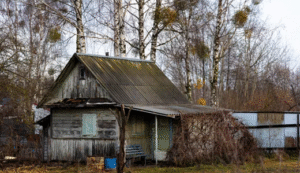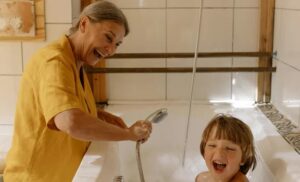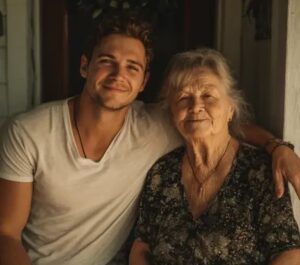He Left His Son With Me for 22 Years — When He Finally Returned, Nothing Was the Same
 \
\
My name is Margaret, and if you had asked anyone in my town to describe me a few decades ago, they would’ve said I was gentle, predictable, and happiest in the quiet corners of a library. I spent most of my adult life as a school librarian, shelving books, recommending novels to reluctant readers, and organizing the kind of story hours that ended with paper crowns and sticky fingers. People knew me for my Friday blueberry muffins and the soft baby blankets I knit for every new mom at church. Strength wasn’t a word I would’ve used for myself—at least not then.
Everything shifted after my husband died of cancer when I was 42. Grief took all the air out of the room, and my daughter, Anna, became the reason I kept getting up in the morning. She was my life raft—bright-eyed, quick with a joke, and stubborn enough to drag both of us through the worst days. By 27, she had her footing in the world: a good job in marketing, a tidy little home just down the street from mine, and a son—my grandson, Ethan—who seemed to carry sunshine in his cheeks. Soft curls, huge brown eyes, a laugh that bounced off the walls. “Mom, you worry for sport,” she’d tease. “This boy is going to be just fine.”
You think you know the shape of your days until the phone rings and folds your life in half.
I was 53 when it happened. A plane crash. Bad weather. Mechanical failure. No survivors. One moment Anna was telling me about something silly Ethan had said at preschool, and the next, there was only a voice on a line, a list of facts delivered like nails. I sank to the kitchen floor. The mug shattered. I didn’t feel the cuts. I just kept saying her name as if I could call her back.
Ethan was three—too young to carry the vocabulary of loss, but old enough to sense the absence. He clung to my sweater and watched the front door for a mother who wouldn’t return. At night, I held him and told him stories about her: her laugh, the way she danced while stirring soup, how she used to hold him and whisper that he was her favorite song. I told myself we would stitch a new life out of the tattered ends of the old one.
But grief sometimes travels in pairs.

A few weeks after the funeral, when the casseroles stopped coming and the house settled into its new, aching quiet, there was a knock at Anna’s door. I was staying there with Ethan—his toys still where she’d left them, her sweater over the back of a chair like she had just stepped into the next room.
It was Mark—Anna’s husband, Ethan’s father. He was standing on the porch with his son’s little suitcase and a look that was less sorrow than vacancy. “I can’t do this,” he said, as if he were returning a rented car. “I’m still young. I want my life back. You take Ethan. You’re good at this. You’ll manage.”
“He’s three,” I said, the words scraping my throat.
“I met someone,” he added. “I’m moving. This isn’t for me.”
He put the suitcase down and left. No hug. No backward glance. Just the sound of his footsteps walking away from a life he decided not to live.
Ethan dragged his stuffed rabbit across the porch boards, leaving a chalky line in the dust. He didn’t understand what had happened, only that something had. I pulled him into my arms and kissed his hair. “It’s you and me now,” I whispered. “We’ll figure it out.”
And we did.

We kept Anna’s little house. It wasn’t perfect. The linoleum curled at the corners. The porch wobbled when the mailman stepped on it. The yard was a patchwork quilt of weeds. But it smelled like cinnamon and soap and the last trace of Anna’s perfume in the hallway. Money was thin, so I strung together jobs like laundry on a line: cleaning medical offices at night, weekend shifts at Mrs. Sutton’s bakery. I came home with flour in my hair and an ache in my back, but I learned how far love can stretch a dollar—and a person.
Ethan grew like a sapling in sunlight. He started as my little shadow, matching his tiny footsteps to mine as he carried bags of groceries from the car one apple at a time. He learned to fold towels, to stir pancake batter, to set the table with a solemnity that made me bite back a smile. By six, he had stopped asking why his father didn’t call; the silence had answered him.
Years spun forward. The measuring marks on the hallway wall ticked higher. The rabbit lost an ear and then an eye, but never its job. School pictures came and went—crooked ties, cowlicks, smiles too big for his face. He learned to be gentle without being fragile, to be firm without being hard. When the world wanted more from him than he had, he worked, and when the world wanted to tell him who he was, he quietly decided for himself.
At twenty-five, he sat across from me at Anna’s old kitchen table—the one with the heat mark from a casserole that was too hot and a Sunday dinner that was too loud. He slid a folder across the table.
“What’s this?” I asked.

“Papers,” he said, a grin working at the corner of his mouth. “The new place. It’s in both our names. I don’t want you living alone. You’ve carried me for so long. Let me carry you for a while.”
“I don’t want to be in your way,” I said, out of habit more than conviction.
“You’re not in my way,” he said softly. “You’re the path.”
So we moved. The house we bought together had sunlight that pooled on the floors in the mornings and a balcony where I could sit with a book and a cup of tea, feeling—maybe for the first time in decades—like I wasn’t holding my breath. I had a small suite of my own, a quilt on the bed that I’d pieced by hand, and a shelf for the storybooks Ethan once asked me to read again and again.
We didn’t sell Anna’s house. Its paint peeled in quiet strips. The yard kept trying to reclaim the walkway. Still, Ethan would say, “Not yet. Let it be. It’s part of us.”
Then one afternoon, the phone rang. It was Mrs. Palmer, the neighbor who’d watched Ethan ride his first bike and pick dandelions for me like bouquets.
“Margaret,” she said, voice low. “He’s back.”
“Who?”
“Mark.”
I could feel my heart pick up and then steady, like it was choosing not to run.
“He stood in front of the old place for a long time,” she continued, “looking at it like it owed him something. Asked if I knew where you and Ethan are. I told him I hadn’t seen you in years.”
Ethan was pouring tea. He set the kettle down carefully, took the phone, and said, “If he comes back, give him our address. He can come to us.”
Two days later, a rusted car rolled into our driveway like a bad memory. Mark stepped out thinner, older, his clothes the color of a long road. What surprised me most wasn’t the wear on him—it was the air he brought with him. Assured. Expecting. As if the years had been a hallway and we’d been waiting at the end.
“Nice place,” he said, whistling low. “You’ve done well, son.”
Ethan stood beside me, a quiet wall.
A white envelope slipped from Mark’s pocket and fluttered to the driveway. Ethan picked it up and opened it. His eyes moved across the page.
“What’s this?” he asked.
“Transfer papers,” Mark answered. “That old house is half mine. Bought it with your mother. Seems only right that I take it back. You’ve got this,” he said, waving his hand at our home. “Let me have the other. Fair’s fair.”
Ethan’s voice stayed even, like still water. “That house is where I learned to tie my shoes. Where Grandma taught me that we don’t throw away what hurts just because it hurts. You left us. You left it. You don’t get to come back and claim the pieces you ignored.”
“You owe me,” Mark snapped. “I gave you life.”
Ethan’s jaw tightened, but his words were careful. “And Grandma gave me everything that came after. Food. Warmth. Time. She was there for every fever and field trip and broken shoelace. You were a door that closed. She was the light we left on. You can’t erase twenty-two years of silence with an envelope.”
He held the papers out. Mark didn’t take them.
“There’s no place for you in that house,” Ethan finished. “And there’s no place for you here.”
I closed the door gently. It settled into the frame with a soft, final sound.
Later, sitting at the kitchen table, I told Ethan something I’d kept to myself. “Your mother bought that house on her own,” I said. “Every down payment dollar was hers. Mark never paid into it. Not once.”
He nodded, not surprised. “Then we restore it,” he said. “Not to sell. To honor it. To honor her.”
We drove over that weekend. The yard had crept closer. The porch sagged. The inside smelled like dust and memory. But when we opened the windows, the rooms breathed again. We walked each room with a pad of paper. “New cabinets here,” he said. “Sand these floors,” I answered. In the hallway, my eyes landed on the faded pencil marks that charted Ethan’s growth. He traced them with a finger.
“This is where you kept your sewing machine by the window,” he said, smiling. “I used to fall asleep to that little whirr.”
“And this is where you lined up your trucks,” I said, pointing to the baseboard nicked by tiny wheels. “Sundays after church, you’d race them end to end.”
We talked about paint colors and roof lines, but we were really talking about something else: how a house can hold a family’s history, and how a family can decide what to do with it.
A few weeks later, Mrs. Palmer called again. “He came back,” she said. “Sat in his car. Looked at the front door. Didn’t get out. Drove away.”
I didn’t feel triumph. Just a quiet, heavy pity—for a man who returned to a life he’d abandoned and found it had learned to live without him.
Because here’s what I know now, after all these years and all those rooms: family is not a claim you make—it’s a promise you keep. It’s who shows up, who stays, who washes the dishes and reads the story and fixes the porch step. It’s who sacrifices without a ledger and loves without a receipt.
In the end, Mark came back to find no door open for him. No house waiting with a light on. Only the echo of choices he can’t unmake and the shape of a family that grew up around the absence he left.
As for us—Ethan and me—we’ll keep the old house and mend it. We’ll pick out flooring and argue about paint chips and laugh when the sink leaks and we can’t find the wrench. We’ll turn the rooms into a museum of ordinary miracles: a repaired banister, a patch of sun on the kitchen tile, blueberry muffins cooling on a wire rack. We’ll tell Anna’s stories to the children who visit, and we’ll let them add their own.
My name is Margaret. I didn’t set out to be strong. I just stayed. And sometimes, staying is the bravest thing a person can do.